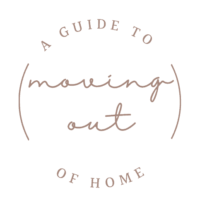
HOW MUCH MONEY DO YOU NEED?
Once you have an idea what type of accommodation will suit you, you can work out how much money you need for upfront costs (bond, rent in advance, application fees etc) and the ongoing costs (rent, utilities).
To get an idea of the cost of renting a room in an established share house in your area, go to flatmates.com or if you are thinking of taking a lease on your own or with a friend try realestate.com.au.
If you are moving into an established share house you might just need to bring your clothes and other personal stuff with you. If you are moving into an unfurnished rental, then your going to need a couple of lists.

How much money do you need for a rental?
Upfront Costs
Application Fee – Some places will charge you a Rental Application Fee of around $50 (non-refundable). This covers the cost for the agent to process your application.
Bond -If your application is successful you will need to pay a Bond. This equates to around 4 weeks rent. If you look after the place – you should get back when you move out.
Upfront Rent – In addition to the Bond, you need to pay two to four weeks’ rent upfront.
Moving Costs -If you are moving locally, you might be able to ask friends to help, otherwise you may need to hire a van.
Utility Connection Fees -You may need to pay for the electricity, gas, internet connection. Costs vary with each company, check with the real estate agent/landlord to find out who are your providers. There may be a bit of a wait to get things connected. Be prepared to not have the internet for a couple of days.
Ongoing costs
Rent – You need to continue to pay rent (monthly) until the last day of your tenancy. Try and align the date you pay the rent to be a couple of days after your pay is due to hit your bank account. This will give you a couple of days flexibility if your pay is delayed for some reason. *Read more about rent below.
Utilities – If the utility bills are not factored into your rent, you will be billed for these utilities quarterly. If you don’t pay them they cut you off your supply, eventually… Then you have to pay reconnection fees.
Parking – If parking is not available at your property, you may need to pay for a permit for street parking.
Contents Insurance – You will need to decide if you are going to insure your personal belongings. What would it cost for you to have to replace your possessions (Clothes, Laptop, Furniture) if there was a flood or fire? Contents Insurance is a very personal choice, you could put the money for insurance premiums into a dedicated emergency fund in your bank account and earn interest. But this money is only for real emergencies, only do this if you are going to be disciplined.
*On Renting – You don’t want to get behind in your rental payments. If you do fall behind in the rent you could be given a breach of contract notice or your rental agreement can be terminated and you will have 7 days to find a new place to live.
If you have a bad experience with a landlord your name could be to a national database used by Real Estate agents and that could make if more difficult for you to get applications approved in the future.
Also note, the landlord can increase your rent once your current agreement is up for renewal. They need to provide notice in writing, the terms are different in every State. So you need to factor in an increase in your budget for any changes or prepare to move…
It’s good to remember that renting a property is not forever, things can change – usually just when you’ve settled in!
